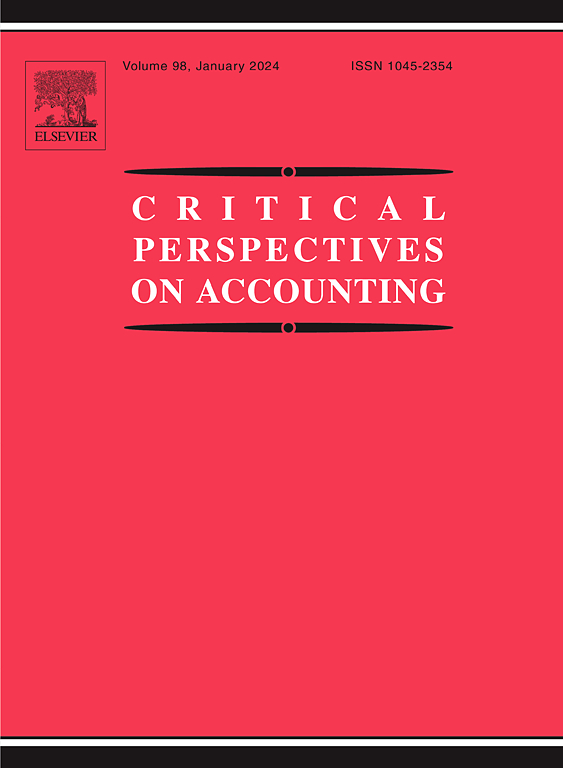内容营销作为人工智能的浪漫管理概念的宣传工具
IF 5.7
2区 管理学
Q1 BUSINESS, FINANCE
引用次数: 0
摘要
根据德勤2017年至2022年的内容营销,本研究根据雅克·埃卢概述的技术宣传原则,研究了人工智能(AI)概念是如何形成和传播的。该公司提倡一种浪漫的人工智能管理理念,认为商业专家可以帮助组织从以人为本的人工智能的神奇承诺中获益,而不会产生任何缺点,这是基于人工智能有可能被控制的假设。该公司动员了三种互补的话语原型来激励组织采取行动:先知,通过传播关于人工智能的“好消息”来激发热情;消除神秘感,麻木对技术社会潜在漂移的担忧;还有不祥之兆的鸟,激起人们对惰性的恐惧。这项研究强调了Jacques Ellul工作的相关性,以激发关键会计界关于人工智能在组织和社会中扩散的危险的持续辩论。除了使专业知识合法化的传统功能之外,内容营销还被用作人工智能概念的宣传工具,这种概念似乎是按照公司自己的专业服务提供的模式塑造的。最后,通过展示如何将宣传的戒律纳入内容营销,本研究强调了当代社会问题的商业化是营销专业知识殖民化专业会计服务的关键一步。本文章由计算机程序翻译,如有差异,请以英文原文为准。
Content marketing as a propaganda vehicle for a romantic-managerial conception of artificial intelligence
Drawing on Deloitte’s content marketing between 2017 and 2022, this study examines how a conception of artificial intelligence (AI) is shaped and disseminated according to the precepts of technical propaganda outlined by Jacques Ellul. The firm promotes a romantic-managerial conception of AI that suggests business specialists can help organizations reap the benefits of the miraculous promises of a human-centered AI, without incurring any of the drawbacks, based on the assumption that it is possible to control AI. Three complementary discursive archetypes are mobilized by the firm to spur organizations into action: the prophet, arousing enthusiasm by spreading the “Good News” about AI; the demystifier, numbing concerns about the potential drifts of the technical society; and the bird of ill omen, stoking a fear of inertia. This study highlights the relevance of Jacques Ellul’s work to stimulate the ongoing debate within the critical accounting community about the perils of AI’s proliferation in organizations and society. Beyond its traditional function of legitimizing expertise, content marketing is mobilized as a propaganda vehicle for a conception of AI seemingly shaped in the mold of the firm’s own professional services offering. Finally, by showing how the precepts of propaganda are incorporated into content marketing, this study highlights the commercialization of contemporary social issues as a pivotal step in the colonization of professional accounting services by marketing expertise.
求助全文
通过发布文献求助,成功后即可免费获取论文全文。
去求助
来源期刊

Critical Perspectives on Accounting
BUSINESS, FINANCE-
CiteScore
9.40
自引率
7.80%
发文量
91
期刊介绍:
Critical Perspectives on Accounting aims to provide a forum for the growing number of accounting researchers and practitioners who realize that conventional theory and practice is ill-suited to the challenges of the modern environment, and that accounting practices and corporate behavior are inextricably connected with many allocative, distributive, social, and ecological problems of our era. From such concerns, a new literature is emerging that seeks to reformulate corporate, social, and political activity, and the theoretical and practical means by which we apprehend and affect that activity. Research Areas Include: • Studies involving the political economy of accounting, critical accounting, radical accounting, and accounting''s implication in the exercise of power • Financial accounting''s role in the processes of international capital formation, including its impact on stock market stability and international banking activities • Management accounting''s role in organizing the labor process • The relationship between accounting and the state in various social formations • Studies of accounting''s historical role, as a means of "remembering" the subject''s social and conflictual character • The role of accounting in establishing "real" democracy at work and other domains of life • Accounting''s adjudicative function in international exchanges, such as that of the Third World debt • Antagonisms between the social and private character of accounting, such as conflicts of interest in the audit process • The identification of new constituencies for radical and critical accounting information • Accounting''s involvement in gender and class conflicts in the workplace • The interplay between accounting, social conflict, industrialization, bureaucracy, and technocracy • Reappraisals of the role of accounting as a science and technology • Critical reviews of "useful" scientific knowledge about organizations
 求助内容:
求助内容: 应助结果提醒方式:
应助结果提醒方式:


